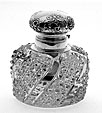The End of an Era
By Bryon Anderson
Reprinted from The Hobstar, Jan/Feb 1986
 On December 31, Donald Parsche locked the door of the Parsche Studios, 4606 N. Western
Ave. in Chicago for the last time, thus closing out an era perhaps unparalleled in the
history of the American cut glass industry. Frank X. Parsche, grandfather of Donald, was
born in Austria in 1847. At the age of 18, he left Austria for Scotland, where he worked
for the Edinburgh Glass Company as an engraver. Eight years later he immigrated to America
where he worked for the Dorflinger Company. A year later he came to Chicago as a glass
engraver for the Burley Co.
On December 31, Donald Parsche locked the door of the Parsche Studios, 4606 N. Western
Ave. in Chicago for the last time, thus closing out an era perhaps unparalleled in the
history of the American cut glass industry. Frank X. Parsche, grandfather of Donald, was
born in Austria in 1847. At the age of 18, he left Austria for Scotland, where he worked
for the Edinburgh Glass Company as an engraver. Eight years later he immigrated to America
where he worked for the Dorflinger Company. A year later he came to Chicago as a glass
engraver for the Burley Co.
In 1876 he opened his own glass cutting and engraving shop using tools he brought with him from Scotland. The business has been in continuous existence, using some of these same tools since that date, almost 110 years. Mr. Parsche’s son, Frank, joined his father in the business in 1890 at the age of 14. Frank’s two sons, Russell and Donald, joined the firm in 1933. After Russell’s death in 1985, Donald has continued the business alone.
Originally, the firm engraved glass, but began producing cut glass in 1892. They were one of the exhibitors at the Columbian Exposition in Chicago in 1893.
Through the productive glass cutting years the F. X. Parsche Co. made glass primarily to be sold through Marshall Field & Co. The elegant Owasco and Cayuga patterns were featured in their downtown store, offered through its mail order catalogue, and sold to dealers and jewelers throughout its wholesale store.
Marshall Field & Co. was known for the high quality of its merchandise and accepted only the finest cut glass. The store’s inspectors routinely inspected the Parsche cutting room to check the quality of the glass. If the glass did not measure up to the Field’s standards, it was rejected. In order to reduce the losses from the pieces that were rejected, the firm was forced to hire only the very finest cutters.
Parsche Co. also produced cut glass bar bottles which were sold to the finest bars to serve their whiskey. They also produced fine cut glass whiskey bottles for some of the leading distilleries, in addition to the cut glass pieces sold in their own store and to other glass wholesalers of the period.
In these days the firm employed as many as fifty cutters together with many other employees to clean, pack and sell the glass. The Company prospered as a leading manufacturer of American Brilliant Cut Glass until 1917. The firm discontinued producing cut glass when World War I made it impossible to secure the quality of glass necessary for fine cutting.
After cut glass production was discontinued, the firm began engraving company names on inkwells and other novelties. The fancy mirrors in the Uptown Theater in Chicago, as well as other theaters, were designed and produced by this firm. Since 1952 the business has been operated by Donald and Russell, and has specialized in repairing chipped glassware and creating and selling custom lamps.
Ellsworth Young, ACGA Central District Director, has purchased much of the cutting and engraving equipment from Mr. Parsche which he will use in his work/hobby of repairing glass.
We are all proud of the contributions to the fine art of American Cut Glass that have been made by F. X. Parsche, his son, Frank, and the grandsons, Donald and Russell Parsche, for better than a century. It is truly the end of an era when this firm closed its doors.
Back to articles index





